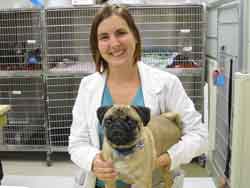Coat & Skin, cont.
Brushing keeps your pup’s coat looking healthy and shiny. “For short coated dogs like Labradors, heavy brushing is not necessary. It helps to reduce shedding, but I recommend not to over brush.” Too much pressing can actually cause skin trauma. “Avoid using too much pressure or brushing the same location over and over again, especially with the metal wire brush. It can become painful and irritating,” says Dr. Hall. Introduce brushing with a gentle brush and light strokes. Do this every day. Over time, it establishes a bond between the two of you and establishes your role as the pack leader. It also teaches your pup to learn and stay still and accept your touch.
Of course, coat and skin care isn’t just about grooming. Keeping your pup up-to-date with preventative medications to thwart unwelcome visitors is also important: “Fleas are not only a pest that cause increased itching, hair loss, and bacterial infections; they also carry other diseases and parasites like tapeworms. The majority of infectious diseases (from fleas and other parasites) are easily preventable with topical and environmental medications.” Many medications are oral, and puppies are often not thrilled about the idea. To make it easier on your pup, wrap the pill in a treat such as a small piece of cheese.
Treats bring up another very important component to keeping your pup’s skin and coat healthy, and it only requires your Lab’s love of food: nutrition. According to Dr. Hall, “It is good to have a diet that is balanced for your dog’s age and nutritional needs. It should have a good source of fatty acids like fish oil.” Some dogs develop food allergies, so if your Lab’s skin seems to be showing the problem and there are other symptoms such as diarrhea, make a visit to your vet.
“By taking an interest in your pup’s coat and skin, you have the better chance to prevent infections and catch problems early to ensure a better response to veterinary therapy in the future,” says Dr. Hall.
Reprinted with permission: Just Labs, March/April 2012 www.justlabsmagazine.com
Life Lessons Learned from a Dog

-If you stare at someone long enough, eventually you will get what you want.
-Always give people a friendly greeting. A cold nose in the crotch is most effective.
-Leave room in your schedule for a good nap.
-Be direct with people; let them know exactly how you feel by peeing on their shoes.
-When you do something wrong, always take responsibility (as soon as you're dragged shamefully out from underneath the bed).
-If it's not wet and sloppy it's not a real kiss.
-Those things in the litter box are not Almond Roca®
Source: Pet Academy


